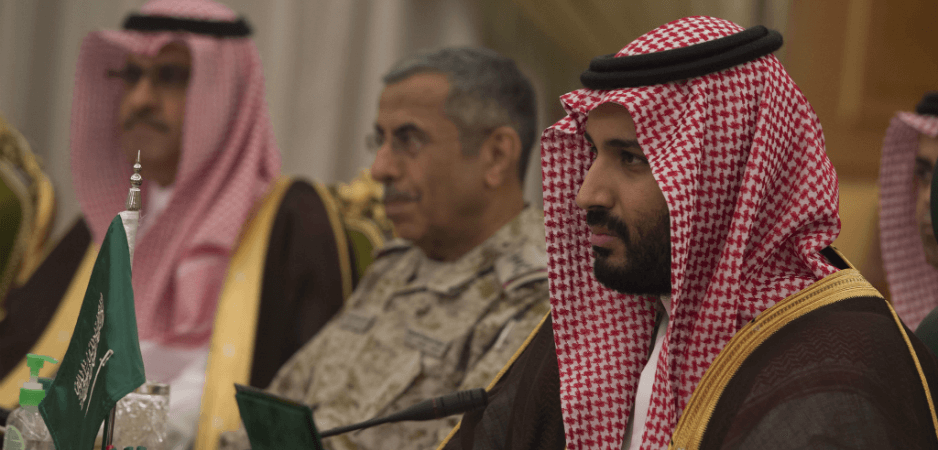At the end of 2017, Mohammed bin Salman stood alone as the effective ruler of a country he intends to recast in his own expansive image.
In 2017, Saudi Crown Prince Mohammed bin Salman (MBS) marked himself out as a Middle East leader to be reckoned with. The consolidation of his power was completed with two audacious maneuvers that saw the removal of the 32-year-old’s chief rivals to the throne currently held by his aged and debilitated father King Salman. In June, he forced out the minister of the interior, Mohammed bin Nayef. Nayef not only lost the ministry, arguably the most powerful in the kingdom, but was also removed as crown prince, the title taken by the ruthlessly ambitious MBS.
Then, in November, in a purge presented as an anti-corruption drive, MBS netted Miteb, a son of the late King Abdullah and head of the Saudi Arabian National Guard (SANG), along with dozens of other senior royals and leading businessmen. Miteb, in addition to losing SANG, reportedly handed over $1 billion to secure his release. Others followed suit, but the billionaire businessman Prince Al-Waleed bin Talal has thus far refused to buy his way out and is demanding his day in court to refute the corruption allegations. Still, at the end of 2017, Mohammed bin Salman stood alone as the effective ruler of a country he intends to recast in his own expansive image.
Vision 2030, the sweeping plan to revolutionize the Saudi economy by energizing the private sector, empowering women in the workforce and privatizing huge swathes of state-owned enterprises, including a 5% IPO for the world’s largest energy corporation, Saudi Aramco, is still in its early stages. But if MBS is able to deliver on promises like meaningful jobs and affordable housing, he will hold the support of young Saudis who make up 70% of the population. For now, at least, his grip on the domestic front appears both complete and secure.
But it is in the domain of foreign policy that MBS will seek to reinforce his claim to leadership of the Arab world in 2018. And it is here, where the recent past serves as a prologue to an uncertain future, that the picture is far less reassuring. The war in Yemen, which he and Abu Dhabi Crown Prince Mohammed bin Zayed launched nearly three years ago, drags on with no end in sight and with interminable suffering for the Yemeni people.
The feud with fellow Gulf Cooperation Council (GCC) member Qatar, which exploded in June of last year amidst allegations that the Qataris were terror funders, continues, even though Saudi Arabia’s Western friends and allies are happy to carry on selling arms to and making deals with this alleged “terror state.”
The dangerous game that MBS is playing with the United States and Israel to drive through a Palestine-Israeli peace deal is made all the more dangerous by President Donald Trump’s declaration of Jerusalem as the capital of Israel. The Palestinians who have been left out in the cold yet again are angry with America. But the anger that cuts deepest is rooted in a sense that the Saudis have betrayed their fellow Arabs and abandoned the cause of Palestine to curry favor with the Israelis and the Americans.
The one place where progress has been made is Iraq. There, the crown prince has shown what he is capable of, playing a deft game of diplomacy aimed at weaning Baghdad away from its dependency on Iran. Iran itself remains a great challenge, but joining forces with Donald Trump and Benjamin Netanyahu to sabre rattle will achieve little else but to stiffen Iranian resolve.
If MBS is to finally consolidate his position as a great and good leader of the Arab world, he will need to find a way out of the quagmire that is Yemen. (A good start would be to declare a unilateral cessation to the air war.) He will need to resolve the GCC feud with Qatar that benefits none but Iran. He will need to bring the Palestinians into meaningful dialogue while distancing himself from the Israelis and treating the Americans with a degree of caution that has been lacking since Trump arrived in the White House.
If he chooses to pursue diplomacy in foreign affairs rather than reaching for military action and ill-considered deals, then Mohammed bin Salman will have gone a long way toward his goal. He is said to be a very intelligent man. It is also true that he is arrogant and impulsive. Thus far it is the arrogant streak that has prevailed and that has led him onto dangerous ground. Is he a leader who learns from his mistakes, or will 2018 see him repeating them? In a year’s time, and perhaps much sooner, we will have the answers.
*[This article was originally published by Gulf House for Studies and Publishing.]
The views expressed in this article are the author’s own and do not necessarily reflect Fair Observer’s editorial policy.
Photo Credit: James N. Mattis / Flickr
Support Fair Observer
We rely on your support for our independence, diversity and quality.
For more than 10 years, Fair Observer has been free, fair and independent. No billionaire owns us, no advertisers control us. We are a reader-supported nonprofit. Unlike many other publications, we keep our content free for readers regardless of where they live or whether they can afford to pay. We have no paywalls and no ads.
In the post-truth era of fake news, echo chambers and filter bubbles, we publish a plurality of perspectives from around the world. Anyone can publish with us, but everyone goes through a rigorous editorial process. So, you get fact-checked, well-reasoned content instead of noise.
We publish 2,500+ voices from 90+ countries. We also conduct education and training programs
on subjects ranging from digital media and journalism to writing and critical thinking. This
doesn’t come cheap. Servers, editors, trainers and web developers cost
money.
Please consider supporting us on a regular basis as a recurring donor or a
sustaining member.
Will you support FO’s journalism?
We rely on your support for our independence, diversity and quality.







